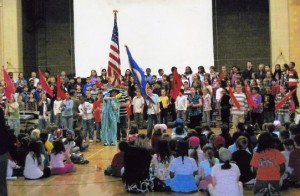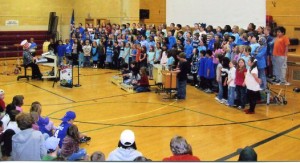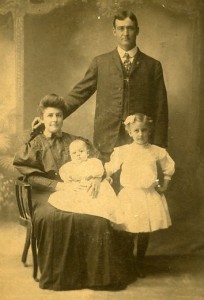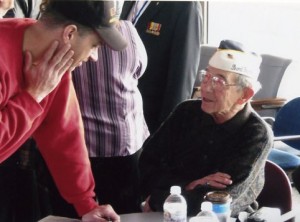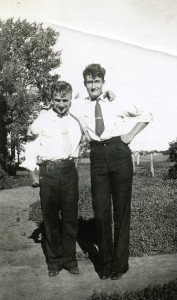UPDATE Sat. March 20, 2010: At the end of this post I mention a long-ago note from a student to my Dad. Yesterday afternoon I located him. He lives in Oregon, and has severe MS. He’s probably about 65 now. His sister, who lives in California and gave me his address, thinks he’ll really appreciate hearing from me. So it goes.
A week ago, March 11, 2010, the Minneapolis Star Tribune published my op ed on my Dad’s teaching career. The column finally resulted in at least 50 comments, 37 of which are on the Star Tribune website, the rest to me, personally. [content of the column is included at the end of this post.]
I wrote the column “from the heart”, as I admitted in a comment to a blog which picked up and published the op ed. I began to question myself: “did I overstate my case”. After all, Dad’s leaving all of those jobs was never dramatic. There was no Donald Trumps “you’re fired”; no being run out of town on a rail. The separation was quiet, the contract simply not renewed with no indication it was coming. There were no reasons, there didn’t have to be. As my youngest brother commented during the days following the column, Dad never bad-mouthed anyone. We just moved on.
Dad did leave behind a summary he wrote of each teaching experience he and Mom had together. I pulled it out of the file, and read it. He never said he was fired, in any instance.
But as I pieced together the reality of the 26 years when one or another of we kids was alive and living at home, he indeed was “fired” at least three times, and probably two or three others as well. The others they left under their own power. Often those voluntary quits from the next towns were because those positions were very inadequate, for sundry reasons.
I can say with a lot of confidence that poor performance, morals, ethics were never an issue. In point of fact, Dad was more likely to have gotten in trouble because his standards were higher than for some specific power actor(s) who controlled whether he stayed in or left the community. Properly disciplining the wrong kid was a job security issue for my Dad.
In his last assignment, when my youngest brother graduated from high school, the high school baseball team won the State High School Baseball Championship. The baseball coach became the new Superintendent, replacing Dad. That’s how it went.
A week after the op ed, I am very, very comfortable that I did not overstate the case.
The words I used in the op ed that I choose to highlight now are Public Servant, and Due Process. Public School employees were and in many ways are still considered to be like a Hired Man or Housekeeper; to keep some stability in the relationships, the due process rights enshrined in teacher contracts need to be kept in force.
My parents were great teachers, and they deserved better than they got.
As it goes in the profession of teaching, there were small victories on occasion.
In Dad’s files I came across a high school graduation announcement including a male students photo and name. The card was dated for a specific year, so I knew in what town they had been living. “These Keepsakes are presented with My Deepest Appreciation and Gratitude for the Educational Opportunities that you have given me” said the printed text, and below was a handwritten note to “Mr. Bernard, I would like to express to you my deepest appreciation for the help you have given me the past two years. I know we have had our disagreements, but I guess everyone has them. Anyway, I can see now that everything was for my own good. Thank you. Sincerely, _____”
I didn’t know the student or the surname, so I asked my siblings who had lived in this particular town, if they knew this boy. One wrote back, noting, to be polite, that the kid was not a prize.
I noted back that teachers tend to keep these kinds of notes – they’re validation for the impossible task they try to perform under sometimes very difficult circumstances.
That student from almost 50 years ago will get his announcement back, if I can locate him. I wonder how he turned out. Stay tuned.
*
Addenda: In the Star Tribune comments noted above, I filed three of my own. Here they are:
Here’s a comment I made to “the cuckingstool” blog: it sort of sums it up for me. In addition I am including two comments I posted on the STrib website on the issue.
To Cuckingstood: I didn’t realize I’d become famous (or infamous) when I submitted this op ed earlier this week. I was writing from the heart. I was primarily reacting to the Newsweek cover story on getting rid of “bad teachers”, in conjunction with an earlier, accidental, discovery in December ’09 that there was some kind of organized covert attempted assault on teacher seniority in Minneapolis. I had read an earlier opinion in the STrib in December, along the lines of and probably closely related to the Samuels column, but can’t honestly say I’ve read the most recent Samuels et al post in its entirety.
Again, I wasn’t responding to Samuels.
Last I looked, there are nearly 40 comments on my STrib op ed, two of the final ones written by me. I make a couple of recommendations there, particularly about the need for true dialogue on the issues (which will be extremely difficult due to the obvious and quite certainly orchestrated attack mode against basic teacher protections like seniority and due process, and the unions which work to protect their members.) Nonetheless, true DIALOGUE amongst the warring parties is needed.
I have absolutely no beef against innovations like Teach for America, but there has to be a process in place to not have it end-around (and destroy) the basic rights of those already in the system.
*
Personal additions by myself to the submissions at the Minneapolis Star Tribune
After a day on-line
I wrote the commentary and have read all of the over 30 comments thus far, plus a dozen more received at home from persons who knew my parents and/or myself. Both Dad and Mom were professionals in every sense of the word and had high expectations for their children and their students. They were pretty typical of teachers in those small towns then, and now. At times Dad’s high expectations collided with some lower individual or community expectation, Power intervened, and lesser standards prevailed and Dad was gone. I can give examples. Being teacher or chief administrator in even a small district had its risks. Unions enhance public education and quality of society generally, but they represent a threat to some for assorted reasons, none truly related to quality. Are unions perfect? Or all school employees? By no means. They are human, like every other profession or institution. But they very significantly help rather than hinder the progress of society. Dad and Mom are long gone, but by no means forgotten. It would be my hope that this column leads to some true community dialogue on the topic at issue. I’m glad I had an opportunity to represent teachers. I hope I contributed a little. I think I did. Dick Bernard Woodbury
*
Probably my final comment, at the Star Tribune website:
To: “Thanks for the article and comment, Dick” (and others as well)
At the end of my second comment (above, “After a day on-line”) I say I “hope that this column leads to some true community dialogue on the topic at issue.” This will be difficult, as “dialogue” does not presume a conclusion before or even following the conversation, but perhaps some understanding might flow from the conversation. Dialogue is not some comment like, “get rid of seniority”, or “fire bad teachers”. My understanding, after a lifetime (literally) in and around public education is that, for example, pay scales were unilateral creations of school boards to deal with a problem: they were initially attempts to differentiate and reward people in their employ who had more training and experience, probably more responsibilities, and thus of greater value to the system. Teacher Unions were late into the process of developing salary schedules. As one octogenarian friend wrote to me, yesterday, when he began teaching in southern Ohio, teachers were regularly let go because younger, less expensive teachers were available and saving money (not quality) entered in. I don’t think pay was a factor in my Dad’s case, at least during the years that he was called Superintendent, and I was alive. He and I talked often about his experiences. My plea is, to all parties, dialogue, to at least attempt to understand. For a moment, leave Power at the door (very, very hard to do, especially for those with the Power.) I appreciate the Star Tribune’s printing my column. Due to editorial limits on number of words, I could not write at as great a length as I would have liked. Dick Bernard, Woodbury MN
*
On dialogue, taken from a column I wrote on “Truth” December 25, 2008. accessible here.
I have long been taken with a quotation I saw in Joseph Jaworsky’s book, “Synchronicity, the Inner Path of Leadership” (1996). Preceding the chapter on “Dialogue: The Power of Collective Thinking”, Jaworsky included the following quote from David Bohms “On Dialogue”. It speaks to this business of talking with, rather than talking to or at others:
“From time to time, (the) tribe (gathered) in a circle.
They just talked and talked and talked, apparently to no purpose. They made no decisions. There was no leader. And everybody could participate.
There may have been wise men or wise women who were listened to a bit more – the older ones – but everybody could talk. The meeting went on, until it finally seemed to stop for no reason at all and the group dispersed. Yet after that, everybody seemed to know what to do, because they understood each other so well. Then they could get together in smaller groups and do something or decide things.”
*
Minneapolis Star Tribune March 11, 2011:
Dick Bernard: Don’t forget those good old days for educators
DICK BERNARD
It seems, from a flurry of commentaries and letters in recent months, that it is again open season on public school teachers, and particularly their unions.
The mantra is always the same: the union is protecting bad teachers and it’s against doing good things, like getting rid of supposedly lifetime no-cut contracts.
Hardly ever is there real evidence of these failings. To make the charge is sufficient evidence.
I plead guilty to having worked full time for 27 years as a teachers union representative (MEA/Education Minnesota). I am further guilty of having taught public school for nine years before that. Long retired, I now have seven grandkids in public schools and a daughter who’s a principal of a large middle school.
I guess I know a bit about the subject at hand.
There is another credential I possess as well. I grew up (born in 1940) in the good old days when teachers had virtually no rights. Both of my parents were career public school teachers from 1929 through 1971. (Mom stayed at home raising her preschool kids for 13 of those years.)
We lived in small towns in a neighboring state. During my growing-up years (I’m the eldest sibling), we moved to eight communities. In each, Dad was called superintendent, but actually was a teaching principal, the administrator who was accountable to the local school board. Later, younger siblings followed my parents to two more towns, until the youngest graduated from high school in 1966.
My parents were outstanding teachers and outstanding citizens of their communities. I know. One or the other was my teacher for my last five years of public school. All five of their kids achieved at least a bachelor’s degree and all have had long productive careers.
But we moved often, and very often that move was necessitated by Dad being fired, in one or another odd and sometimes innovative way.
These were the good old days of “at will” contracts. All it took was some disgruntled citizen who knew the right people to dispatch these outsiders at the annual contract renewal time. (In my files I have nearly every one of those single sheet “contracts” signed by my parents in their careers.)
Dad always took a philosophical view of the firings, but down deep, I think they hurt him deeply. Recently I came across an essay he wrote about the various ways he was fired during his long career. It was funny, in a very sad way.
Protections that are revolting to some — things like due process, seniority, continuing contract — came about because of abundant abuses in those good old days when the teacher was, literally, a “public servant.”
It’s much nicer to just label some generic teacher as “bad,” and then to blame the evil union for protecting his or her right to due process.
I’d suggest that those who wish to eliminate teacher rights and defang teacher unions had best be very careful lest they get what they pray for. They would not like the results.
Are there “bad teachers”? Of course. Just as there are bad parents, bad executives, bad politicians, bad journalists. We know them when we see them.
Or do we?
Those seeking to get rid of seniority and the like can find more constructive ways to help public education.
Sadly, I’m not holding my breath.
Dick Bernard, Woodbury, is a retired teacher and union representative.
